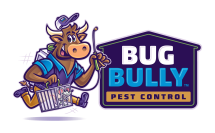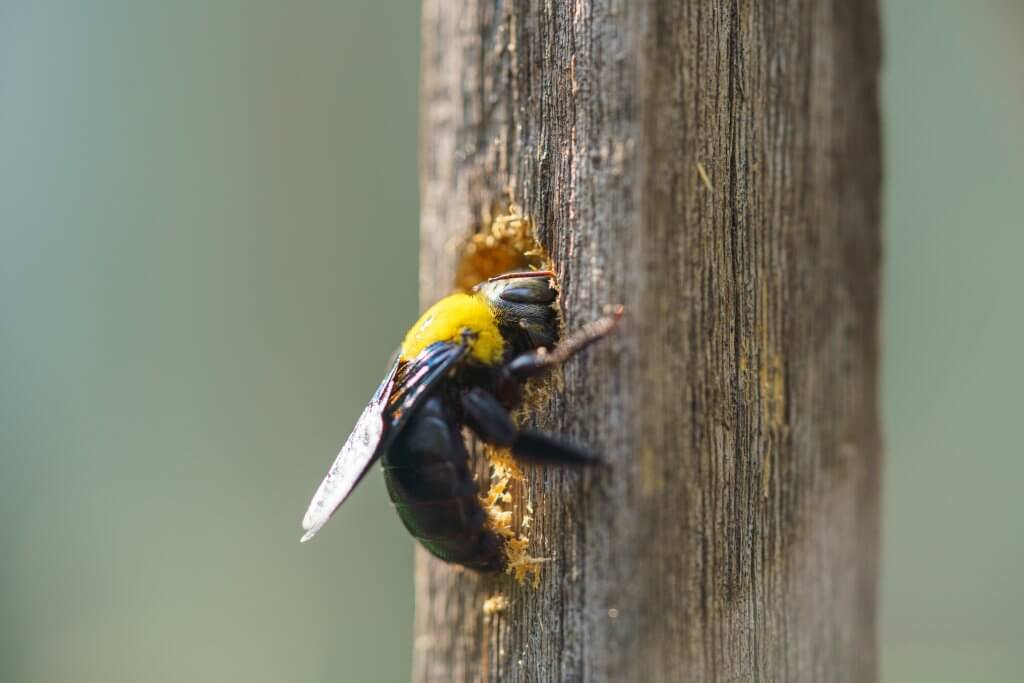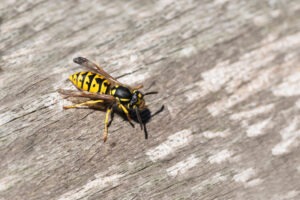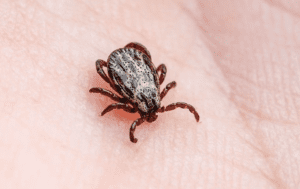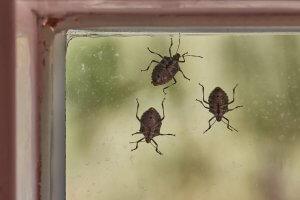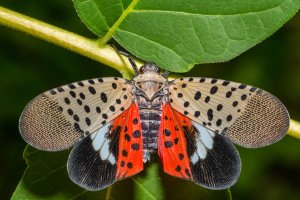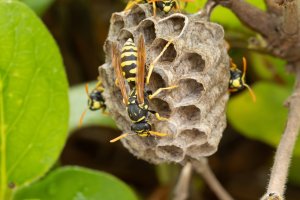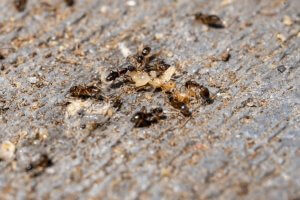If you’ve noticed large, buzzing bees hovering near your deck, fence, or the eaves of your home or restaurant, chances are you’ve encountered carpenter bees. These bees are often mistaken for bumblebees, but unlike their cousins, they have a unique habit that can cause real problems for homeowners and businesses across Central Massachusetts.
At Bug Bully Rodent & Pest Control, we frequently help families and restaurant owners in Worcester, Framingham, Northborough, and Concord deal with carpenter bee infestations. While these insects are not typically aggressive, the structural damage they create by drilling into wood can become costly if ignored. In this article, we’ll walk you through what carpenter bees are, why they’re a problem, and how carpenter bee control can protect your property.
What are Carpenter Bees?
Carpenter bees (Xylocopa spp.) are large, solitary bees known for boring holes into wood to build their nests. They closely resemble bumblebees, but you can tell them apart by looking at their abdomens. Bumblebees are fuzzy all over, while carpenter bees have shiny, black abdomens with little hair.
Instead of building hives, female carpenter bees tunnel into untreated or weathered wood to create galleries where they lay their eggs. Over time, these tunnels can weaken wood structures, making them a real threat to decks, siding, fences, and even restaurant patios.
Why Carpenter Bees Matter in Central Massachusetts
Carpenter bees are common in suburban and rural areas where wood is plentiful. For homeowners in Worcester County, this often means decks, sheds, and porches become prime targets. For restaurant owners in Concord and Framingham, outdoor dining setups and wooden furniture can quickly fall victim to tunneling activity.
Unlike termites, carpenter bees don’t eat wood. Instead, they excavate it to create nesting galleries. However, the resulting holes and tunnels can weaken structures, allow moisture to seep in, and attract other pests such as woodpeckers.
The buzzing of carpenter bees is often intimidating, especially when males hover around porches or patios. While males don’t sting, their aggressive flight patterns can make outdoor spaces uncomfortable for homeowners, diners, and guests.
How to Identify Carpenter Bees
Carpenter bees are fairly easy to recognize once you know what to look for.
- Appearance: Large and similar to bumblebees, but with a shiny black abdomen.
- Size: Around one inch long.
- Behavior: Males hover around nesting sites and dive at people, though they cannot sting. Females bore smooth, round holes about the size of a dime into wood.
- Signs: Perfectly round entry holes in decks, fences, or siding, along with sawdust-like shavings below. You may also notice yellowish staining from pollen and bee waste near the holes.
If you see bees repeatedly flying around a wooden structure and notice fresh holes, it’s time to call a carpenter bee exterminator.
The Impact on Homeowners
For homeowners and renters in Central Massachusetts, carpenter bees pose two major challenges: property damage and intimidation.
The holes they drill are not just cosmetic. Over time, galleries can extend deep into beams, causing weakening. Multiple generations of carpenter bees often reuse the same tunnels, expanding them further. Left untreated, this damage can lead to costly repairs to decks, fences, siding, and even structural supports.
The second challenge is psychological. Male carpenter bees are territorial and will hover aggressively around people and pets. While they cannot sting, their behavior can make it unpleasant to spend time outdoors. Female carpenter bees do have stingers, but they rarely sting unless directly handled.
The Impact on Restaurants
Restaurants in Worcester, Concord, and surrounding towns often rely on outdoor seating during warm months. Unfortunately, carpenter bees are drawn to wooden railings, pergolas, tables, and fences.
Customers enjoying a meal may not care whether the bees are stingers or not—they simply see large buzzing insects hovering near their food. This can lead to negative reviews and fewer diners opting for outdoor tables. Additionally, visible holes and sawdust around outdoor structures can create an impression of neglect, which no restaurant owner wants.
Carpenter bee control in Massachusetts is especially important for restaurants with patios or outdoor bars. Proactive management helps keep diners comfortable and protects valuable outdoor structures.
Carpenter Bee Control in Massachusetts
Effective carpenter bee control requires both eliminating current activity and preventing future infestations. At Bug Bully Rodent & Pest Control, we use an integrated approach:
- Inspecting wooden structures for active nesting holes.
- Treating and sealing tunnels to eliminate current infestations.
- Applying protective treatments to deter bees from returning.
- Recommending long-term preventive steps such as painting or staining exposed wood.
DIY methods, such as plugging holes with caulk, often fail if the bees are still inside. Professional carpenter bee exterminator services ensure nests are treated safely and effectively.
Fun Facts About Carpenter Bees
- Male carpenter bees may act tough by buzzing around aggressively, but they cannot sting.
- Carpenter bees prefer untreated or weathered wood, making older decks and fences more vulnerable.
- Female carpenter bees often return to the same nesting site year after year, expanding tunnels.
- Woodpeckers are natural predators of carpenter bee larvae, and they may cause even more damage trying to dig them out.
- Carpenter bees are valuable pollinators, despite their destructive nesting habits.
Common Questions Answered
Do carpenter bees sting?
Males cannot sting, though they may fly aggressively near people. Females can sting but rarely do unless handled directly.
Will carpenter bees destroy my home?
Carpenter bees don’t eat wood, but their tunneling can weaken structures over time, especially when infestations recur year after year.
Can I just fill in the holes myself?
Plugging holes without treatment can trap bees inside, causing further damage as they chew their way out. Proper treatment is essential before sealing entry points.
Why are they targeting my deck?
Carpenter bees are attracted to untreated or weathered wood. Decks, fences, pergolas, and siding are common nesting spots in Massachusetts homes and restaurants.
How can restaurants protect outdoor seating?
Restaurants can reduce risk by painting or sealing exposed wood, scheduling inspections, and working with a carpenter bee exterminator for proactive control.
The Long-Term Outlook in Massachusetts
Carpenter bees are native to the United States, and their presence in Massachusetts is not going away. While they play a role in pollination, their nesting behavior makes them a long-term challenge for homeowners and restaurant owners.
As more people invest in outdoor living spaces, decks, and restaurant patios, encounters with carpenter bees are likely to remain common in Worcester County and Middlesex County. Managing them requires a balance of protecting wood structures and maintaining safe outdoor spaces.
What Bug Bully Rodent & Pest Control Recommends
For homeowners and restaurants in Central Massachusetts, our recommendations are straightforward:
- Inspect wooden structures in spring when carpenter bees become active.
- Treat and seal any holes promptly to prevent further tunneling.
- Consider painting or staining decks and fences, as bees prefer bare wood.
- Contact a professional carpenter bee exterminator if you see multiple bees or repeated infestations.
At Bug Bully Rodent & Pest Control, we specialize in safe and effective carpenter bee control. Our team can protect your home, apartment, or restaurant so you can enjoy outdoor spaces without the stress of buzzing intruders.
A Final Word
Carpenter bees may look like harmless bumblebees, but their wood-boring habits can cause lasting damage to homes and businesses in Central Massachusetts. For homeowners, they threaten decks, fences, and siding. For restaurant owners, they create an unpleasant experience for outdoor diners and can leave visible damage to patios and structures.
The good news is that professional carpenter bee control in Massachusetts is both effective and long-lasting. At Bug Bully Rodent & Pest Control, we are committed to helping Worcester, Framingham, Northborough, and Concord residents reclaim their outdoor spaces from these unwanted visitors.
Don’t let carpenter bees undermine your property or your peace of mind. Call in the professionals and enjoy the outdoors without worry.
